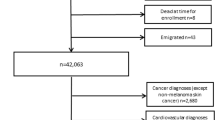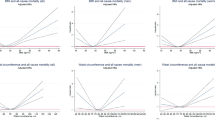Abstract
Objectives
To examine the association between weight change and mortality in middle-aged and elderly Chinese.
Methods
We used data from the Singapore Chinese Health Study among 36 338 participants aged 45 to 74 years at recruitment (1993–1998). Weight change was computed as the difference between weights at baseline and the follow-up 1 (1999–2004) surveys and classified as moderate-to-large weight loss (≥10%), small weight loss (5.1–9.9%), stable weight (±5%), small weight gain (5.1–9.9%) and moderate-to-large weight gain (≥10%). The participants were free of cancer and cardiovascular disease (CVD) at the follow-up 1 survey and were followed for mortality through linkage with the Singapore Birth and Death Registry.
Results:
Until 31 December 2016, a total of 7551 deaths were identified during 517 128 person-years of follow-up (mean follow-up: 14.2 years). Compared to those with stable weight, significantly increased risk of all-cause mortality was found for participants with moderate-to-large weight loss (hazard ratio [HR]: 1.39; 95% CI: 1.30, 1.49), small loss (1.14; 1.06, 1.22), and moderate-to-large gain (1.13; 1.05, 1.22). Moderate-to-large weight loss was significantly associated with increased risk of mortality from CVD (including both ischemic heart disease and stroke) and respiratory disease, while moderate-to-large weight gain was significantly associated with CVD mortality. Associations were generally consistent in stratified analyses by sex, age groups (<60 and ≥60 years old), smoking status (never, former and current smoking), and baseline body mass index (<23 and ≥23 kg/m2), although significant effect modifications were found for certain strata.
Conclusions
Our findings showed that both moderate-to-large weight gain and loss conferred excess risk for all-cause and CVD mortality in middle-aged and elderly Chinese, with slightly higher risk for weight loss than weight gain. However, it remains to be examined in clinical trials whether maintaining stable body weight should be proposed to reduce mortality risk in middle-aged and elderly populations.
This is a preview of subscription content, access via your institution
Access options
Subscribe to this journal
Receive 12 print issues and online access
$259.00 per year
only $21.58 per issue
Buy this article
- Purchase on Springer Link
- Instant access to full article PDF
Prices may be subject to local taxes which are calculated during checkout

Similar content being viewed by others
References
Lyall DM, Celis-Morales C, Ward J, Iliodromiti S, Anderson JJ, Gill JMR, et al. Association of body mass index with cardiometabolic disease in the UK Biobank: a Mendelian randomization study. JAMA Cardiol. 2017;2:882–9.
Hruby A, Manson JE, Qi L, Malik VS, Rimm EB, Sun Q, et al. Determinants and consequences of obesity. Am J Public Health. 2016;106:1656–62.
Narayan KM, Boyle JP, Thompson TJ, Gregg EW, Williamson DF. Effect of BMI on lifetime risk for diabetes in the U.S. Diabetes Care. 2007;30:1562–6.
Global BMI Mortality Collaboration, Di Angelantonio E, Bhupathiraju ShN, Wormser D, Gao P, Kaptoge S, et al. Body-mass index and all-cause mortality: individual-participant-data meta-analysis of 239 prospective studies in four continents. Lancet. 2016;388:776–86.
Aune D, Sen A, Prasad M, Norat T, Janszky I, Tonstad S, et al. BMI and all cause mortality: systematic review and non-linear dose-response meta-analysis of 230 cohort studies with 3.74 million deaths among 30.3 million participants. BMJ. 2016;353:i2156.
Zheng W, McLerran DF, Rolland B, Zhang X, Inoue M, Matsuo K, et al. Association between body-mass index and risk of death in more than 1 million Asians. N Engl J Med. 2011;364:719–29.
Karahalios A, English DR, Simpson JA. Change in body size and mortality: a systematic review and meta-analysis. Int J Epidemiol. 2017;46:526–46.
Cheng FW, Gao X, Jensen GL. Weight change and all-cause mortality in older adults: a meta-analysis. J Nutr Gerontol Geriatr. 2015;34:343–68.
WHO Expert Consultation.. Appropriate body-mass index for Asian populations and its implications for policy and intervention strategies. Lancet. 2004;363:157–63.
Nanri A, Mizoue T, Takahashi Y, Noda M, Inoue M, Tsugane S, et al. Weight change and all-cause, cancer and cardiovascular disease mortality in Japanese men and women: the Japan Public Health Center-Based Prospective Study. Int J Obes. 2010;34:348–56.
Yun KE, Park HS, Song Y-M, Cho S-I. Increases in body mass index over a 7-year period and risk of cause-specific mortality in Korean men. Int J Epidemiol. 2009;39:520–8.
Kim Y-H, Kim SM, Han K-d, Son J-W, Lee S-S, Oh SW, et al. Change in weight and body mass index associated with all-cause mortality in Korea: a nationwide longitudinal study. J Clin Endocrinol Metab. 2017;102:4041–50.
Odegaard AO, Pereira MA, Koh WP, Gross MD, Duval S, Yu MC, et al. BMI, all-cause and cause-specific mortality in Chinese Singaporean men and women: the Singapore Chinese Health Study. PLoS One. 2010;5:e14000.
Hankin JH, Stram DO, Arakawa K, Park S, Low SH, Lee HP, et al. Singapore Chinese Health Study: development, validation, and calibration of the quantitative food frequency questionnaire. Nutr Cancer. 2001;39:187–95.
Odegaard AO, Pereira MA, Koh WP, Arakawa K, Lee HP, Yu MC. Coffee, tea, and incident type 2 diabetes: the Singapore Chinese Health Study. Am J Clin Nutr. 2008;88:979–85.
Talaei M, Pan A, Yuan JM, Koh WP. Dairy Food Intake Is Inversely Associated with Risk of Hypertension: The Singapore Chinese Health Study. J Nutr. 2017;147:235–41.
Butler LM, Wang R, Koh WP, Yu MC. Prospective study of dietary patterns and colorectal cancer among Singapore Chinese. Br J Cancer. 2008;99:1511–6.
Odegaard AO, Koh WP, Yuan JM, Gross MD, Pereira MA. Dietary patterns and mortality in a Chinese population. Am J Clin Nutr. 2014;100:877–83.
National Registry of Diseases Office. Singapore Cancer Registry Annual Registry Report 2015. In: 5.6 Mortality Rates by Gender, 2011–5. Singapore: National Registry of Diseases Office; 2017.
Durrleman S, Simon R. Flexible regression models with cubic splines. Stat Med. 1989;8:551–61.
Walston J, Hadley EC, Ferrucci L, Guralnik JM, Newman AB, Studenski SA, et al. Research agenda for frailty in older adults: toward a better understanding of physiology and etiology: summary from the American Geriatrics Society/National Institute on Aging Research Conference on Frailty in Older Adults. J Am Geriatr Soc. 2006;54:991–1001.
Kritchevsky SB, Beavers KM, Miller ME, Shea MK, Houston DK, Kitzman DW, et al. Intentional weight loss and all-cause mortality: a meta-analysis of randomized clinical trials. PLoS One. 2015;10:e0121993.
Simonsen MK, Hundrup YA, Obel EB, Gronbaek M, Heitmann BL. Intentional weight loss and mortality among initially healthy men and women. Nutr Rev. 2008;66:375–86.
Berentzen T, Sorensen TI. Effects of intended weight loss on morbidity and mortality: possible explanations of controversial results. Nutr Rev. 2006;64:502–7.
Gill LE, Bartels SJ, Batsis JA. Weight management in older adults. Curr Obes Rep. 2015;4:379–88.
Park SY, Wilkens LR, Maskarinec G, Haiman CA, Kolonel LN, Marchand LL. Weight change in older adults and mortality: the Multiethnic Cohort Study. Int J Obes. 2017;42:205–12.
Mulligan AA, Lentjes MAH, Luben RN, Wareham NJ, Khaw KT. Weight change and 15 year mortality: results from the European Prospective Investigation into Cancer in Norfolk (EPIC-Norfolk) cohort study. Eur J Epidemiol. 2018;33:37–53.
Sauvaget C, Ramadas K, Thomas G, Vinoda J, Thara S, Sankaranarayanan R. Body mass index, weight change and mortality risk in a prospective study in India. Int J Epidemiol. 2008;37:990–1004.
Frank BH. Obesity epidemiology. Vol. 1. Oxford University Press: New York; 2008.
Wada K, Tamakoshi K, Tsunekawa T, Otsuka R, Zhang H, Murata C, et al. Validity of self-reported height and weight in a Japanese workplace population. Int J Obes. 2005;29:1093–9.
Okamoto N, Hosono A, Shibata K, Tsujimura S, Oka K, Fujita H, et al. Accuracy of self-reported height, weight and waist circumference in a Japanese sample. Obes Sci Pract. 2017;3:417–24.
Lee CG, Boyko EJ, Nielson CM, Stefanick ML, Bauer DC, Hoffman AR, et al. Mortality risk in older men associated with changes in weight, lean mass, and fat mass. J Am Geriatr Soc. 2011;59:233–40.
Acknowledgements
We thank Siew-Hong Low of the National University of Singapore for supervising the fieldwork in the Singapore Chinese Health Study and Renwei Wang for the maintenance of the cohort study database. We thank the Ministry of Health in Singapore for assistance with the identification of deaths from cirrhosis and other causes via database linkages. This study was supported by the National Institutes of Health, USA (R01 CA144034 and UM1 CA182876). W-P Koh is supported by the National Medical Research Council, Singapore (NMRC/CSA/0055/2013). A Pan is supported by the National Key Research and Development Program of China (2017YFC0907504). XF Pan is supported by the 2018 Australian Endeavour Research Fellowship (69362018). The sponsors have no role in the study design, and collection, analysis or interpretation of data.
Author information
Authors and Affiliations
Corresponding authors
Ethics declarations
Conflict of interest
The authors declare that they have no conflict of interest.
Electronic supplementary material
41366_2018_259_MOESM4_ESM.docx
Table S3 Associations of weight change with all-cause and cause-specific mortality in the SCHS: subgroup analysis by sex
41366_2018_259_MOESM5_ESM.docx
Table S4 Associations of weight change with all-cause and cause-specific mortality in the SCHS: subgroup analysis by age
41366_2018_259_MOESM6_ESM.docx
Table S5 Associations of weight change with all-cause and cause-specific mortality in the SCHS: subgroup analysis by BMI (cut-off of 23.0 kg/m2)
41366_2018_259_MOESM7_ESM.docx
Table S6 Associations of weight change with all-cause and cause-specific mortality in the SCHS: subgroup analysis by BMI (cut-off of 25.0 kg/m2)
41366_2018_259_MOESM8_ESM.docx
Table S7 Associations of weight change with all-cause and cause-specific mortality in the SCHS: subgroup analysis by smoking status
41366_2018_259_MOESM9_ESM.docx
Table S8 Associations of weight change with all-cause and cause-specific mortality among 29,158 never smokers in the SCHS
Rights and permissions
About this article
Cite this article
Pan, XF., Yuan, JM., Koh, WP. et al. Weight change in relation to mortality in middle-aged and elderly Chinese: the Singapore Chinese Health Study. Int J Obes 43, 1590–1600 (2019). https://doi.org/10.1038/s41366-018-0259-y
Received:
Revised:
Accepted:
Published:
Issue Date:
DOI: https://doi.org/10.1038/s41366-018-0259-y
This article is cited by
-
Association of body mass index and weight change with pneumonia mortality in a Japanese population: Japan Public Health Center-based Prospective Study
International Journal of Obesity (2023)
-
Early adulthood weight change, midlife “Life’s essential 8” health status and risk of cardiometabolic diseases: a chinese nationwide cohort study
Nutrition & Metabolism (2023)
-
Three-year weight change and risk of all-cause, cardiovascular, and cancer mortality among Iranian adults: over a decade of follow-up in the Tehran Lipid and Glucose Study
BMC Public Health (2022)
-
Impact of weight variability on mortality among Korean men and women: a population based study
Scientific Reports (2019)



